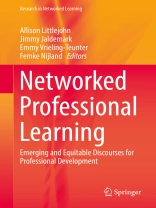Over the past decades a new form of professionalism has emerged, characterized by factors of fluidity, instability and continual change, leading to the necessitation of new forms of professional development that support agile and flexible expansion of professional practice. At the same time, the digitization of work has had a profound effect on professional practice. This digitization opens up opportunities for new forms of professional learning mediated by technologies through networked learning. Networked learning is believed to lead to a more efficient flow of complex knowledge and routine information within the organization, stimulate innovative behaviour, and result in a higher job satisfaction. In this respect, networked learning can be perceived as an important perspective on both professional and organizational development. This volume provides examples of Networked Professional Learning, it questions the impact of this emerging form of learning on the academy, and it interrogates the impact on teachers of the future. It features three sections that explore networked professional learning from different perspectives: questioning what legitimate forms of networked professional learning are across a broad sampling of professions, how new forms of professional learning impact institutions of higher education, and the value creation that Networked Learning offers professionals in broader educational, economic, and social contexts. The book is of interest to researchers in the area of professional and digital learning, higher education managers, organizational HR professionals, policy makers and students of technology enhanced learning.
Inhaltsverzeichnis
Chapter 1. Networked professional leaning: an introduction.- Part I. Networked Professional Learning across the professions.- Chapter 2. Professional learning in open networks: How midwives self-regulate their learning in Massive Open Online Courses.- Chapter 3.New educational formats for professional development: Accommodating the invisible learners.- Chapter 4. Presence – a prerequisite for learning in the crisis management context?.- Part II. The impact of Networked Professional Learning on the Academy.- Chapter 5.Networked learning in, for and with the world.- Chapter 6.Learning in hybrid protopublic spaces: Framework & exemplars.- Chapter 7. Designs for Learning as springboards for Professional Development in higher education.- Chapter 8. Design principles for Professional Networked Learning in ‚learning through practice‘ designs.- Chapter 9.Teachers’ beliefs about professional development: Supporting emerging networked practices in higher education.- Part III. Networked Professional Learning in teacher learning groups.- Chapter 10. Learning to teach in a remote school context: Exploring the organisation of teachers’ professional development of digital competence through networked learning.- Chapter 11.Value creation in teacher learning networks.- Chapter 12. Analysing social learning of teacher-learning groups that aim at knowledge creation.- Chapter 13. Maker Spaces in schools: Networked learning among teachers to support curriculum-driven pupil learning in programming.- Part IV. Conclusion.- Chapter 14.Networked professional learning, design research and social innovation.
Über den Autor
Allison Littlejohn is a Dean in the College of Social Sciences at the University of Glasgow, where she Directs a programme of research in Professional and Digital Learning. Throughout her career she has worked in the area of learning innovation, technology, knowledge creation and academic-business partnerships. She envisions bringing together ideas from higher education and industry, encourages cross-sector thinking and working across traditional boundaries between sectors and disciplines to transform the ways professionals learn.
Jimmy Jaldemark is an Associate Professor in the Department of Education at Mid Sweden University. His areas of research focus are game-based learning, higher education, learning theory, mobile learning, online supervision, power, socio-cultural perspective, and technology-enhanced learning. Throughout his career, he has worked with the application of these areas in professional development projects at different levels of the educational system.
Emmy Vrieling-Teunter is an Assistant Professor of Teachers’ Professional Development in Social Networks and Self-Regulation at the Open University of the Netherlands. Her work concentrates on exploring social learning dimensions as well as self-regulated learning processes that facilitate professional development in educational institutes. Her research addresses informal learning, social learning, social media, self-regulated learning, metacognition, reflection and motivation. She has published and presented her research in national and international research journals, books and conferences. Emmy is also Staff Member of the Dutch Interuniversity Center for Educational Research and Editorial Board Member of the Dutch Association for Teacher Educators.
Femke Nijland is an Assistant Professor at the Welten Institute, Research Centre for Learning, Teaching, and Technology at the Open University of the Netherlands. Her research focuses on networked learning and value creation. She aims at bridging the gap between educational research and practice, working in close collaboration with teachers and schools at innovative educational projects to stimulate teacher professional development.












